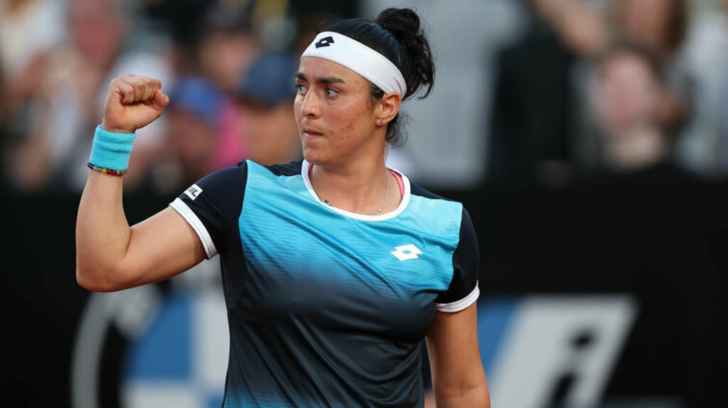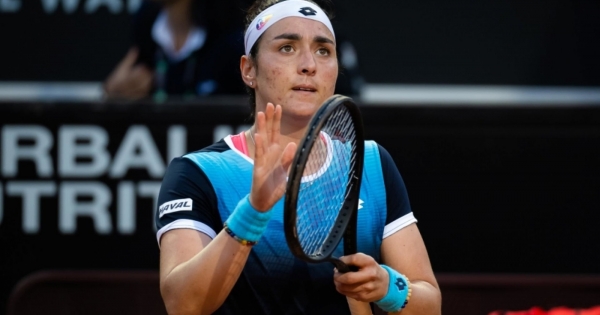The young Tunisian coach Omar Al-Obeidi was sure from childhood that his companion Anas Jaber, ranked sixth in the world in tennis, would enter the international level due to her high competitiveness and superiority over rivals from early childhood.
Al-Obaidi, 28, said in front of the Anas Jaber tennis court in her honor at the Hammam Sousse (East) club, where the champion grabbed the racquet for the first time: “I remember we called her Roger Federer. ,” in reference to the Swiss tennis legend.
He continued, “I ran into her while training. I threw a falling ball. I tried to catch her, but I fell and broke my arm.” From this date, “She called me Hubayza (in the Tunisian dialect it means defeated).”

Anas started in the coastal Souss governorate in the east of the country in hotel stadiums in the tourist area, then moved to the Hammam Souss Club stadium in the same governorate. At that time, her coach, Nabil Malika, discovered in herself a unique talent with the character of “trying to stand out” from the rest of her peers and boys.
Jaber, 27, recently achieved the highest ranking among Arab players in the WTA tennis classification after climbing to sixth on Monday, the best achievement of her career since reaching the final of the 1,000th clay-court tournament in Rome. where she lost to the world number one from Poland, Iga Sheventek.
– she moves a lot –
Jaber, the first Arab woman to enter the top 10 in the world last year, rose to prominence this year after being crowned the Madrid Thousand Tournament a few days ago, the biggest of her career and second only to England’s Birmingham last year.
Malika, 55, who has accompanied Jaber in training for a decade and is still holding on to coach Al-Baram at the same club, says: “She had great ball control so other coaches tried to bring her in.” to handball, and Anas really seriously thought about changing her specialty, but got stuck in tennis.
Photos of Jaber adorn the walls of the stadiums of the Hammam Sousse club, where she took her first steps in the world of yellow football. Dozens of children even practice and imitate the way she screams when she serves at competitions.
Anas, or “Minister of Happiness”, as the Tunisians call her, was born in the city of Qasr Hilal (east), in a family consisting of two boys and two girls, the youngest of them.
Jabeur returns to challenge for the Roland Garros title on clay courts in Paris, looking back to 2011 when she garnered attention after winning the Women’s French Open at the age of sixteen.
At the age of twelve, Jaber moved to the capital Tunisia to train at the Institute of Sports in El Menza (a government that includes elite athletes) to start a new path in her life. She was accompanied at the time by Omar Al-Obeidi, a professional tennis player who currently coaches this specialty at Hammam Sousse.
Malika opens her cell phone and looks at old photos of Jaber when she was 12 that he still keeps and shows them during training to some of the younger players to convince them that “nothing is impossible, she was a spark” . enthusiasm and movement, always trying to show that she has the best control of the game.”
Malika told AFP: “She always embarrasses me with the rest of her colleagues. I hesitated between going through a stronger level of training or waiting for her companions to catch up with her level and pace.”
– ‘Everything was arguing’ –
It is known that Anas has a special style of play in how she cracks down on her opponents during the match and looks for beautiful serves: “She hates playing in one format, she always strives to create a spectacle by diversifying the game with shots that surprise the opponent, especially with the help of fallen balls,” according to Malika, who confirms that she is “really a long time drop-shot queen.”
Her height is 1.67 m, she leans on her right hand. Since 2015, she has been married to her PE coach and former fencer, Karim Kammoon.
Anas hasn’t changed much, “cheerful and adapts quickly even with those you don’t know”, as before, “provocative and argues on all topics with great competition”. But on the other hand, “she fights and plays until the last moment and is difficult to handle, so she continues to play despite the injury,” according to Al-Obaidi.
All those who knew her earlier claim that her “character has not changed” despite being widely known, so that she retained “the ability to collect balls after training while running, and this habit accompanied her from the very beginning of the game.” , according to Maliki.
Tennis has grown in popularity among kids thanks to international brilliance. The membership of her parent club in Hammam Sousse has doubled since Jaber began her ascent in the professional rankings in 2018, reaching over 700 members, both women and men.
Yusra Kubaa, Yasmin’s 8-year-old mother who trains at the club, says Jaber is “an example of the hope we bring to our children every time.”
Source: El Iktisad
